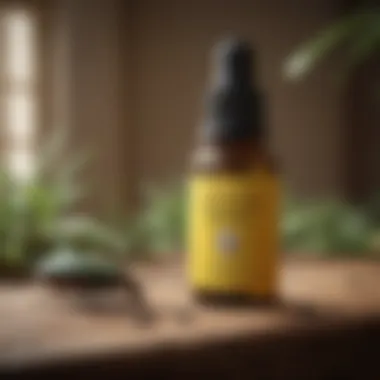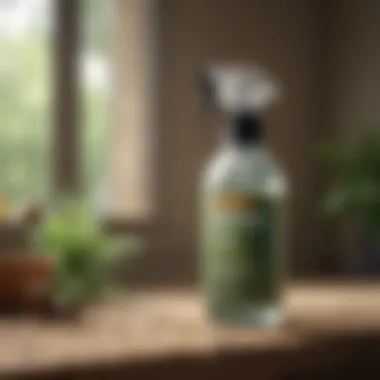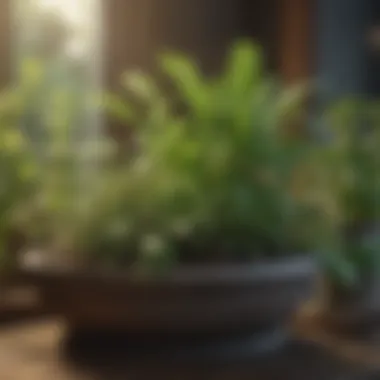Effective Home Remedies to Keep Bugs Away Naturally


Intro
Managing a bug-free home requires a thoughtful approach to pest control. Homeowners often seek solutions that do not rely on harsh chemicals. This article delves into effective home remedies tailored to repel various insects. By utilizing everyday household items and natural ingredients, homeowners can create a more pleasant living environment. The insights provided here will empower readers with practical knowledge for sustainable pest management.
Understanding Common Household Pests
Before exploring remedies, it is essential to understand the types of pests often found in homes. Common insects include ants, mosquitoes, flies, and spiders. Each type of bug requires specific remedies tailored to its behavior and habitat.
- Ants: These small insects trail in search of food and moisture. Simple barriers can often deter them.
- Mosquitoes: Known for their itchy bites, they breed in standing water. Eliminating stagnant water is crucial.
- Flies: Attracted to food and waste, effective management relies on cleanliness and certain scents.
- Spiders: While not directly harmful, many people prefer to keep them at bay. Specific smells can repel them.
Home Remedies
Essential Oils
One of the most versatile solutions involves essential oils. Many oils possess repelling properties that deter pests effectively. Some notable essential oils include:
- Peppermint: A natural ant repellent.
- Lavender: Keeps mosquitoes and flies away.
- Eucalyptus: Effective against mosquitoes.
To utilize essential oils, dilute with water in a spray bottle and apply it to areas where insects are a problem. This method is non-toxic and pleasant-smelling.
Homemade Sprays
Creating homemade sprays is another efficient way to pacify bug issues. Here are a few easy recipes:
- Vinegar Spray: Mix equal parts of vinegar and water. This is effective against ants and spiders.
- Soap Water Spray: Combine water with a drop of dish soap. It can eliminate soft-bodied insects like aphids.
- Citrus Spray: A strong blend of citrus peels and water can deter flies and mosquitoes.
"Natural solutions often blend well with everyday routines, making pest management seamless and non-intrusive."
Physical Barriers
Utilizing physical barriers is another fundamental method. Install fine mesh screens on windows and doors to prevent insects from entering. Moreover, sealing cracks in walls and around windows can thwart pests' access without relying on chemical solutions.
Cleanliness and Maintenance
Maintaining a clean environment is critical in bug management. Regularly dispose of waste, clean food areas, and store food in airtight containers. This practice lessens the chances of attracting unwanted insects.
Intro to Home Remedies
In recent years, a significant shift has occurred in how we approach pest control within our homes. Amid growing concerns about the health implications of chemical products, many homeowners are searching for more natural alternatives. This article aims to explore the realm of home remedies that repel bugs effectively. By focusing on practical and accessible solutions, this guide ventures beyond mere suggestions towards providing methods that can seamlessly integrate into daily life.
The relevance of this exploration lies in the diverse range of options available. Using common items from our kitchens or gardens can serve as a powerful strategy against unwanted insects, such as ants, mosquitoes, and cockroaches. These remedies not only replace chemical products but also align with a growing preference for sustainability and self-sufficiency in home management.
Understanding the Need for Alternatives
As the public becomes more aware of the potential dangers associated with synthetic pesticides, a clear need emerges for alternatives. Traditional bug repellents often contain harmful ingredients that not only affect insects but may also impact human health and the environment. For instance, many commercial insecticides are linked to respiratory issues and skin irritations. Home remedies provide a viable solution by utilizing ingredients that are generally considered safe for human use and often available at home.
Moreover, the economic aspect plays a crucial role. Many homeowners find that purchasing organic or specialty bug repellents can be costly. Home remedies can drastically reduce these expenses without sacrificing effectiveness. With a simple blend of ingredients like vinegar, essential oils, or herbs, one can create an effective barrier against insect infestations.
Benefits of Using Home Remedies
Adopting a home remedy approach brings multiple advantages. One of the primary benefits is safety. Using natural substances minimizes the risk of adverse reactions or toxicity issues typically associated with conventional pesticide usage. Families with children and pets can greatly benefit from this aspect, as home remedies offer peace of mind without compromising safety.
Another significant advantage is environmental impact. In a time when ecological sustainability is a growing concern, opting for homemade solutions markedly reduces chemical runoff and pollution caused by commercial products. Natural remedies tend to be biodegradable and have less of a lasting footprint, supporting a more eco-friendly lifestyle.
Additionally, the ease of accessibility cannot be ignored. Most ingredients needed for effective home remedies are readily available in the average household. Items such as vinegar, essential oils, and various herbs are inexpensive and can often serve multiple purposes beyond mere insect repellency.
"Home remedies illustrate a powerful, practical approach to managing pests while promoting safety and sustainability."


Overall, these considerations emphasize that home remedies not only provide an alternative to commercial pesticides but also align with the broader themes of health, safety, and environmental consciousness. As we delve deeper into specific household insects and their respective natural deterrents, the practicality and effectiveness of these home strategies will become even clearer.
Common Household Insects
Understanding the types of common household insects is critical for effective pest management. Each insect presents unique challenges, necessitating thorough knowledge for appropriate preventive strategies. These insects often invade homes for food, water, and shelter, and their presence can disrupt daily life.
Identifying the signs of infestation aids in timely intervention, reducing the need for more extreme measures later. Moreover, addressing the problem at its roots through preventive measures can save homeowners considerable time and money, making it a vital aspect of maintaining a peaceful living space.
Ants
Ants are social insects known for their ability to form colonies and work together efficiently. They can invade homes in search of food and water, and their presence can indicate other underlying problems, such as poor sanitation or food waste. Some common species include the carpenter ant, sugar ant, and odorous house ant, each with specific behaviors and nesting habits.
To keep ants at bay, homeowners should consider cleaning up spills immediately, sealing food in containers, and ensuring no open access to water sources. Home remedies like vinegar or essential oils can effectively deter ants without resorting to harmful chemicals.
Mosquitoes
Mosquitoes are infamous for their irritating bites and potential to transmit diseases. They breed in stagnant water, making it essential to remove sources of standing water around the home. Consider common breeding areas, such as clogged gutters, bird baths, and children’s toys left outside.
To repel mosquitoes naturally, homeowners can use essential oils, such as citronella or eucalyptus, which are known for their bug-repelling qualities. Setting up mosquito traps or using screens on doors and windows can also reduce their entry into living spaces.
Spiders
Spiders often evoke a sense of fear in many people, but they play a role in controlling other insect populations. However, if they become too numerous or enter living areas, it may be time to take action. Many spiders prefer dark, undisturbed areas in the house.
To deter spiders, homeowners should keep spaces clean and free of clutter. Regularly dusting and vacuuming can help minimize their presence. Essential oils like peppermint can be diluted and sprayed around the house to create an unwelcoming environment for these eight-legged creatures.
Cockroaches
Cockroaches are hardy pests that thrive in human environments. They are nocturnal, often hiding during the day and coming out at night. Infestations can indicate poor hygiene standards or moisture problems in the house. They can trigger allergies and asthma in sensitive individuals.
Once an infestation is identified, steps should be taken to eliminate food sources and eliminate potential nesting sites. Using a mixture of baking soda and sugar can create a homemade bait that effectively attracts and kills cockroaches. Additionally, sealing cracks and crevices around the house can prevent future infestations.
Flies
Flies are not only annoying but are also known carriers of diseases, making them a significant nuisance in any home. They generally enter through open doors or windows and are attracted to food waste, garbage, and overly ripe fruits.
To keep flies away, it is essential to maintain cleanliness in the kitchen. This includes ensuring trash cans are tightly sealed and removing food residues. Homemade traps using vinegar or fruit can be practical. Hanging fly paper can also assist in trapping those that enter the home.
Essential Home Remedies for Bug Repelling
Homeowners often seek effective ways to keep insects at bay, especially when traditional chemical solutions may pose health risks or environmental concerns. Essential home remedies provide practical alternatives that are easily accessible and cost-effective. By utilizing common ingredients found in most households, these solutions can help maintain a pest-free environment.
Home remedies often exhibit compelling benefits. They are typically less harsh than chemical pesticides, making them a favored choice for families, pets, and people with sensitivities. Furthermore, these methods often align with sustainable living values, allowing individuals to contribute positively to their surroundings while keeping bugs away. It is equally important to note that the practical application of these remedies can often lead to interesting DIY projects for the whole family.
Vinegar Solutions
Vinegar is a multifunctional household item. Its acidity makes it an excellent natural repellent for various insects. Vinegar solutions can be tailored to target specific pests, amplifying their effectiveness.
White Vinegar Applications
White vinegar is a staple in many kitchens. Its key characteristic comes from its acetic acid content, which serves as a potent insect deterrent. White vinegar can effectively repel ants and spiders when sprayed around entry points. The strong smell acts as a barrier, forcing insects to seek alternative routes.
An advantage of white vinegar applications is the convenience of use. It can simply be mixed with water in a spray bottle and applied as needed. However, one downside is the odor. While it dissipates over time, some may find it unpleasant initially.
Apple Cider Vinegar Remedies
Apple cider vinegar, known for its distinct aroma and health benefits, also serves as a useful insect repellent. Its unique characteristic lies in its natural sweetness combined with high acidity. This makes it particularly appealing to flies while being repellent to other pests.


Apple cider vinegar can be diluted in water to create an effective spray. One of the main advantages lies in its dual functionality: it can be used to repel insects while also providing health benefits when ingested. However, like white vinegar, its strong smell may deter some users from widespread application.
Essential Oils
Essential oils have gained popularity in natural pest control due to their pleasing scents and effective results. When used correctly, they can repel bugs without any harmful side effects.
Peppermint Oil
Peppermint oil stands out due to its refreshing scent and strong insect-repelling properties. This oil is particularly effective against ants and spiders. Its key characteristic is the menthol present, which creates a chilling sensation for insects, making them reluctant to enter treated areas.
The main advantage of peppermint oil is its natural fragrance, which many find enjoyable, unlike harsh chemical-based repellents. It is also very effective for targeted pest control. However, its volatile nature means that it needs frequent reapplication, especially in varying weather conditions.
Lavender Oil
Lavender oil is well known for its calming effects on humans. However, it possesses insect-repelling qualities, making it an excellent addition to pest control strategies. Its key characteristic lies in its floral scent, which repels mosquitoes and moths effectively.
The advantage of using lavender oil is twofold: it helps to create a pleasant atmosphere while acting as a natural repellent. Moreover, it can be used in sachets, sprays, or even in the garden. Nonetheless, it may not be as effective against every type of insect.
Eucalyptus Oil
Eucalyptus oil is another powerful essential oil known for keeping bugs at bay. Its characteristic scent, alongside its natural repelling qualities, makes it unfriendly to mosquitoes and other biting insects.
Using eucalyptus oil is favorable as it can be combined with other oils for enhanced effectiveness. One disadvantage, however, could be that some people may find its scent too overwhelming when applied in larger quantities.
Herbal Remedies
Herbal remedies are another effective solution for keeping pests away. Many herbs naturally repel insects, providing a fresh and fragrant alternative to chemical repellents.
Clove and Bay Leaves
Clove and bay leaves are well regarded for their potent aroma. Clove is known for its strong scent, which is often unappealing to insects, especially cockroaches. Bay leaves, when placed in cupboards or pantry areas, can also deter pest activity due to their firm fragrance.
These herbs are easy to find and use. One disadvantage, though, is their effectiveness may vary depending on the quantity used and placement within the home.
Garlic and Onion Mixture
A blend of garlic and onion is notorious as a pest repellent with unique and strong odors. The sulfur compounds in garlic and onion can dissuade many insects, especially mosquitoes. This mixture can be made into a spray by blending the ingredients and combining them with water.
The key advantage is its simplicity; garlic and onions are readily available in almost every kitchen. However, the potent smell can be off-putting for some individuals, possibly limiting broader application.
Citrus Interventions
Citrus fruits and their by-products can serve as effective bug repellents. Their antidotal properties can deter unwanted insects without expelling appealing scents to humans.
Lemon Juice as a Repellent
Lemon juice is a natural bug deterrent due to its high acidity and citrus aroma. Spraying lemon juice diluted in water around entry points helps repel ants and other pests.
A major advantage is that the fresh scent can be pleasant, leaving the area smelling invigorating. On the downside, direct sunlight can cause the juice to dry quickly, meaning that reapplication is often necessary.
Orange Peels and Their Uses
Orange peels have similar properties; they contain essential oils that repel insects. They can be placed around the house in areas prone to insect visitation or even added to potpourri for dual purposes.
The unique feature of orange peels is that they are a zero-waste solution, as they can be recycled after consuming the fruit. The primary disadvantage, however, is their effectiveness is more limited when compared to concentrated essential oils.
Homemade Traps


Creating homemade traps can be an efficient solution for managing pest problems. They are generally low-cost and can easily be made from common household items.
Simple Jar Traps
Simple jar traps serve as a practical way to catch flies and other small insects. These traps can be created by placing a small amount of vinegar or sugar water in a jar and covering it with plastic wrap punctured with small holes. The insects are attracted to the scent but cannot escape.
An advantage is the simplicity and effectiveness of this approach; jars are often readily available. However, depending on the number of insects, these traps may need to be monitored and emptied frequently.
Soap and Water Traps
Soap and water traps are also efficient tools for pest control. This method involves mixing water with a few drops of liquid soap in a shallow dish. The soap breaks the surface tension, causing insects to drown upon contact.
This method is favored for its effectiveness in targeting various flying insects. Yet, a drawback is that it can be less visually appealing in a home setting, requiring strategic placement to avoid creating a mess.
Preventive Measures for Pest Control
Preventive measures are essential for effective pest control. Understanding how to maintain a bug-free environment is crucial for homeowners. These strategies not only help in managing insect infestations but also create a healthier living space. It is easier and more efficient to prevent pests than to eliminate them once they have established a presence.
The following sections will highlight specific preventive measures that can significantly reduce the chances of insect infestations. Regular cleaning, sealing entry points, and maintaining garden hygiene are vital steps in pest management. Each of these actions contributes to a sustainable pest control plan.
Regular Cleaning
Regular cleaning is one of the most effective ways to keep bugs at bay. Insects are often attracted to food particles and clutter. By keeping your home tidy, you minimize potential food sources for pests. Dusting surfaces and vacuuming floors should be part of your weekly routine. Pay special attention to the kitchen, as it is a prime target for insects.
- Remove food crumbs and spills immediately.
- Store food in airtight containers.
- Empty trash bins frequently and use bins with lids.
In addition, cleaning appliances such as toasters and microwaves is important. These areas can accumulate debris and attract pests. By maintaining a clean environment, you also ensure that your home remains a less inviting place for bugs.
Sealing Entry Points
Sealing entry points is crucial for preventing insects from entering your home. Small openings allow bugs to invade easily. Inspect doors and windows for gaps. These can be sealed with caulk or weather stripping. Other areas to check include:
- Cracks in the foundation
- Gaps around utility lines and vents
- Holes in screens
By securing these entry points, you greatly reduce the risk of pests entering your home. It's a simple yet effective measure that can save you a lot of trouble later on.
Maintaining Garden Hygiene
Your garden can attract many pests, so maintaining its hygiene is important. Eliminate standing water, which can serve as a breeding ground for mosquitoes. Regularly trimming plants and removing dead foliage can help reduce hiding spots for insects. Some additional tips include:
- Compost organic waste properly to avoid attracting pests.
- Keep gutters clean and free of debris.
- Rotate plants and crops to disrupt pest cycles.
A well-maintained garden contributes to overall pest management by making your outdoor environment less inviting to insects. These practices not only protect your home but also promote a healthier ecosystem around you.
"Prevention is always better than cure. Keeping pests away is much simpler when proactive measures are taken."
By embracing these preventive measures, homeowners can create a living space that is less susceptible to bug invasions. This approach not only enhances comfort but also contributes to a sustainable and responsible way of managing pests.
Ending
Understanding how to effectively keep bugs away through home remedies is essential for creating a comfortable and healthy living environment. This article highlights various natural alternatives to conventional pest control methods. By employing solutions like vinegar mixtures, essential oils, and homemade traps, homeowners can address pest issues without relying on harmful chemicals. This approach not only protects the health of residents but also contributes to environmental sustainability.
Summary of Remedies
A range of effective remedies has been presented throughout the article. Here are the main methods that can be employed:
- Vinegar Solutions: Both white vinegar and apple cider vinegar can be used to create natural repellent sprays.
- Essential Oils: Peppermint, lavender, and eucalyptus oils serve as effective insect deterrents when used in diffusers or applied to surfaces.
- Herbal Remedies: Utilizing clove and bay leaves or garlic and onion mixtures can naturally repel various pests.
- Citrus Interventions: Lemon juice and orange peels are useful options to discourage bug presence due to their strong scents.
- Homemade Traps: Simple traps using jars or soap and water mixtures can effectively capture unwanted insects.
Encouragement for Sustainable Practices
As we draw conclusions on home remedies, it is vital to adopt an ongoing commitment to sustainable practices in pest control. Regular cleaning, proper sealing of entry points, and maintaining garden hygiene not only fend off bugs but also ensure a holistic approach to home maintenance.
By implementing these natural remedies and preventive measures, homeowners can protect their spaces efficiently while contributing positively to the planet's well-being. Sustainable pest management benefits the environment, creating a balanced ecosystem where both people and nature can thrive.
In choosing natural solutions over synthetic options, we take steps toward a healthier home and planet.
By embracing these methods, individuals can feel empowered to manage their pest issues sustainably.







